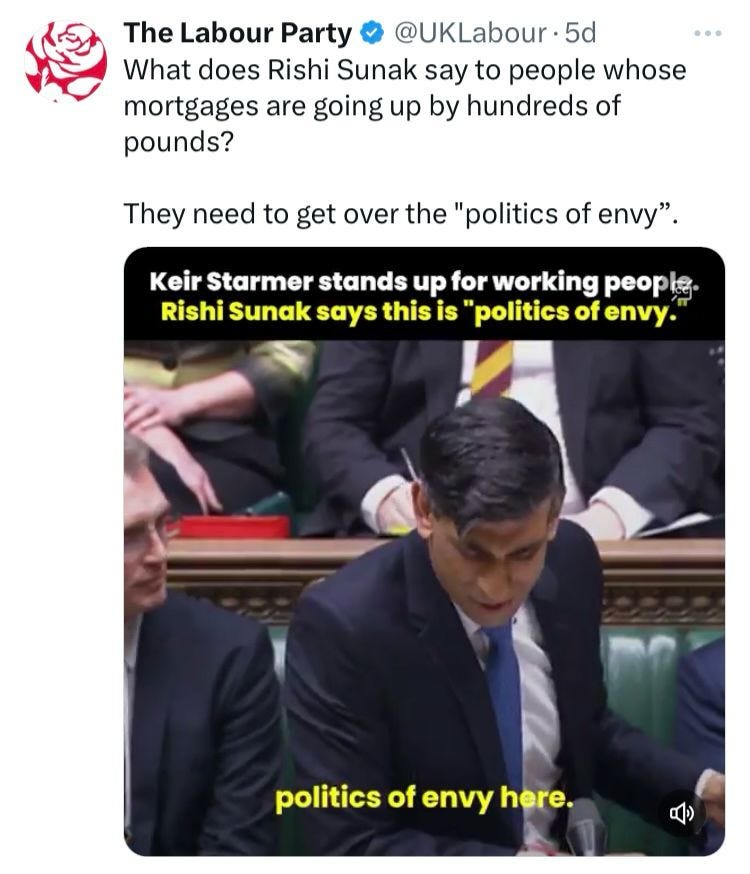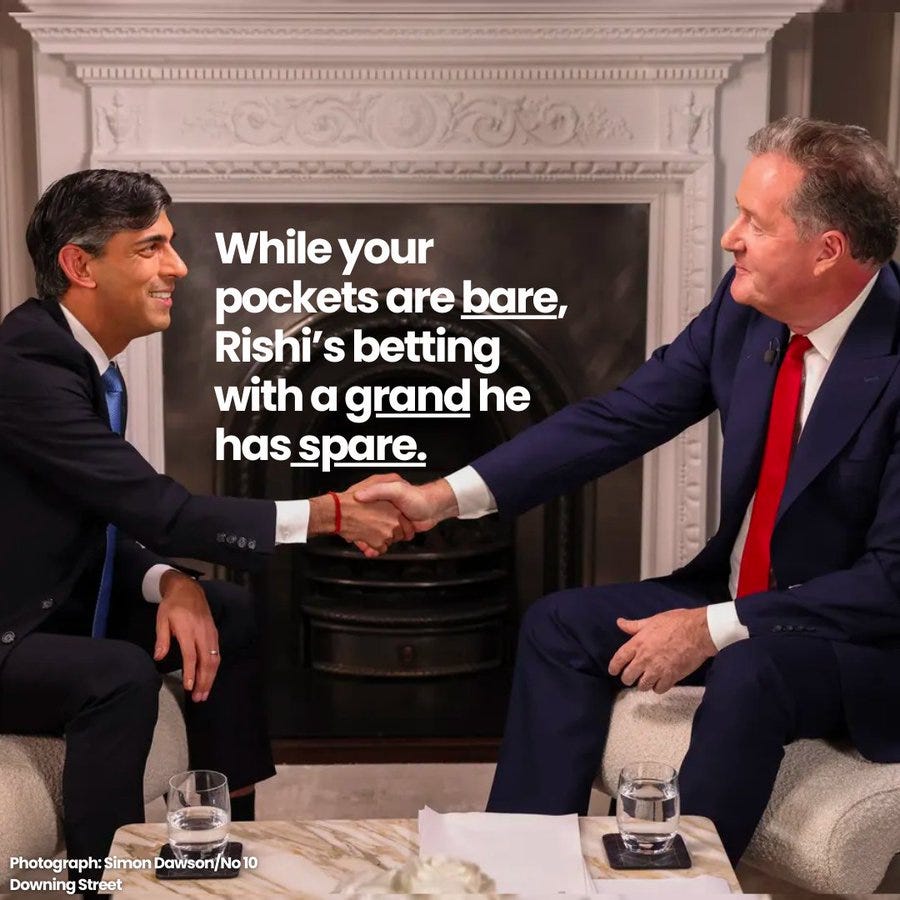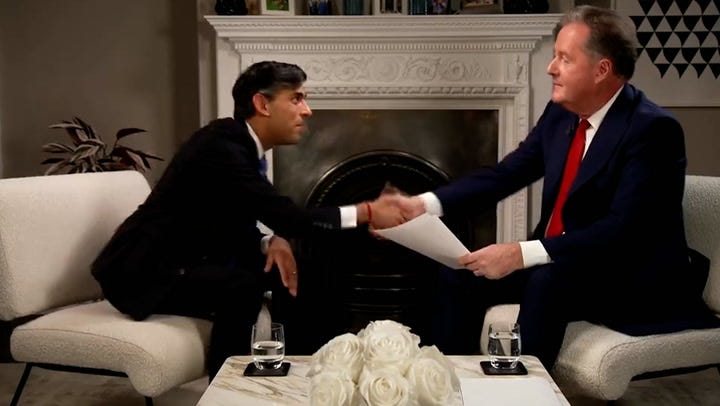Rishi Sunak has more money than you. That’s not a criticism of him, or of you. It’s just a fact. Lots of people are richer than you, probably,1 although few of them are as rich as Rishi Sunak is.
That doesn’t have to be a problem. In fact, in many areas of Sunak’s life, being rich is the opposite of a problem: he can afford to do nice things like own a penthouse apartment in Santa Monica, California, a mansion in North Yorkshire, a five-bedroom mews house in Kensington and a flat in West London, or have a swimming pool, gym and tennis courts installed in one of his houses, or donate over £100,000 to his old school, or host his staff at a Mayfair restaurant after completing a spending review, or hold “parties with liveried staff pouring champagne from magnums”, or pay out of his own pocket for a management consultancy firm to assess plans to downgrade an A&E used by his constituents,2 or buy different kinds of bread for every member of his household. But politically, being as rich as this isn’t an unalloyed positive.
For a start, as I just said, he’s richer than you. That means that he does not have to face some of the problems you, or other people who are not as rich as him, have to face: the weekly shop being more expensive than it used to be, the rent or the mortgage going up, not being able to afford the cost of skiing trips and music lessons on top of £42,000 per year school fees, having to water down baby formula. And that means - or it can be portrayed as meaning - that even if he has some sympathy for those problems, he can never fully understand them.
Most MPs are nowhere near as rich as Rishi Sunak, and some of them have their own cost of living problems - see for example George Freeman, the subject of last week’s Dividing Lines post and also of an item on last week’s episode of our new podcast The Election Tricycle,3 who resigned as a minister because even on a ministerial salary he could not afford a £1,200 per month rise in his mortgage. Unsurprisingly, Keir Starmer raised Freeman’s case at last Wednesday’s PMQs, along with the case of an Iceland employee, “Phil”, who was also facing a large mortgage rise:
“I invite the Prime Minister to get in touch with Phil and explain to him how paying £1,000 more in his mortgage is making him better off, because that is not how he feels. The Prime Minister is so out of touch, it is unbelievable. Finding hundreds of pounds extra per month may not seem like a big deal to the Prime Minister, but let me tell him that most people do not have that sort of money knocking around.”
This was bait, and Sunak took it, complaining that Starmer “resorts here, as always, to the politics of envy”. This is exactly what Labour would have wanted him to say, and this is what they did with it (as usual, you can’t embed tweets or Twitter videos on Substack but you can watch it if you click on it):
It’s telling that complaining about “the politics of envy” was Sunak’s first instinct here. It’s not the only explanation of what Starmer was doing when he referred to Sunak’s wealth, but it’s easy to see why it’s the most attractive one to a wealthy person. “You are jealous of me” is about your bad character (and it implies that I do indeed have something to be jealous of, which reflects well on me). “You think I am out of touch” is about mine.
And this is why Sunak’s wealth is such a political weakness. It’s not that he’s got money. It’s that he hasn’t ever got to grips with the politics of having money. He equivocated pointlessly last year when asked by Laura Kuenssberg whether he uses a private GP, claiming that it was a private matter before acknowledging several days later, to the surprise of absolutely nobody, that he had used independent healthcare in the past. He is oblivious to the particular political risk to him personally of travelling around by helicopter (which, to be clear, is not a direct product of his own wealth: his helicopter trips have been paid for either by donors or by the taxpayer). He says things, as at PMQs last week, that suggest that he thinks only envy would lead an opponent to point out that he does not face the same financial struggles as people in the country he leads. Last year, when accused by Piers Morgan of being “stinking rich”, he paused before describing himself as “financially fortunate”, which sounds like an airport bookshop euphemism for “stinking rich”. Sunak comes across as being proud, embarrassed and oblivious about his money, in regular cycles.
Which brings us to the latest Piers Morgan interview scandal, which is Sunak’s apparent acceptance of a £1,000 bet that flights will start taking refugees to Rwanda before the next election.4
A lot of the commentary has been about the general tastelessness of betting on the lives of vulnerable people, which is fair enough, although I’d put the responsibility for that more on Morgan, whose idea it was, than on Sunak. And I’m not entirely convinced about the wisdom of an interview whose key points are: a) I predicted that waiting lists would come down, and I admit they haven’t; b) I predict Rwanda flights will take off, and yes of course I’ll bet you they will.
The tastelessness of the bet has made it a story, and Sunak has already tried to explain what happened:
“I am not a betting person and I was taken totally by surprise in that interview.
“The point I was trying to get across – I was taken totally by surprise – was actually about the Rwanda policy and about tackling illegal migration, which is something I care deeply about.”
That’s “I was taken totally by surprise” twice in two sentences. We can argue about whether politicians lie, but I have absolutely no doubt that Sunak is telling the truth here. He really was taken totally by surprise.5 “I was ambushed by a school bully” is not much of a defence, but I’m prepared to accept it’s true.
Labour isn’t leaning into “Sunak is weak” here, though (and, to repeat, Sunak’s own defence on this is “I am weak”). Labour is leaning into the £1,000. This is an amount of money most people simply could not afford to gamble, and would never consider betting on anything. Plenty of people like a flutter every now and then. Very few people can risk putting a grand on a horse. Hence this graphic:
For as long as Rishi Sunak makes his own money an issue - squirming about his use of private healthcare, ostentatiously taking private jets, complaining that people who point out that he doesn’t face financial pressures are engaging in the politics of envy, behaving like someone who doesn’t know how to go shopping, accepting £1,000 bets - Labour are going to make his money an issue. The way to stop your opponents punching the bruise is to cover up the bruise. Sunak keeps pointing to it, and saying “Stop punching this bruise!” instead. It doesn’t work. It can’t be pleasant for him. But at least he’s got money.
If this isn’t the case and only very few people are richer than you, this is my moment to say that although this is a free Substack and will remain so, Substack offers an automatic option to pledge money to me anyway.
As someone who’s worked with a lot of politicians, this is the one that really sticks out for me: the ability not just to campaign against a local NHS change, which lots of MPs do, but to spend what would comfortably have been a five-figure sum of his own money on getting a second opinion on a local public service organisational decision. This is the difference between being an MP on a salary which is admittedly well above the national average, and being a multi-millionaire.
I am now contractually obliged to mention this podcast, in which three of us look at developments in this year’s Indian, US and UK general elections, in every post. It’s out every Wednesday! Listen! Subscribe! Tell your friends! (NB I am not in fact contractually obliged to mention it; I don’t even have a contract.)
There’s an argument that “I’m not a betting man” is not true, based on something spotted and tweeted by Sunder Katwala. Last year, Sunak told BBC Test Match Special that he had enjoyed spread betting during the 2005 Ashes series:
“I was doing this internship for my new job, and we spent the summer not just watching it but I also, which was quite dangerous, discovered this, I think it was around that time that spread betting had become a thing online, I had certainly never done it before, but then, so I was sitting there working doing my investing, finance job, and then on the other screen, it’s quite helpful in those jobs you have multiple screens, on the other screen I was doing, you know, next wicket partnership, next wicket fall, innings total, I just discovered this thing and it was great so I had the summer doing that as well.”
This is funny. Gotchas are always funny. But it’s also overdone: the fact that someone has gambled in the past doesn’t mean that they are lying when they say they are not a betting person now, or that they have insufficient self-control to resist any betting opportunity. Which is more likely: that Sunak took Piers Morgan’s bet because he has been an inveterate gambler ever since the 2005 Ashes and he relished the opportunity, or that Sunak took Piers Morgan’s bet because it would have been mildly awkward, in the moment, not to and he failed to think quickly enough about either the political downsides of taking it or the alternatives to shaking Morgan’s hand? To put it another way: was he lying about his gambling habit, or is he just bad at interviews? Two pieces of evidence - he is very rich, and he is bad at interviews - suggest the latter.







How is Sunak making his money an issue by saying, in response to a question, that his healthcare arrangements are private? Are you saying he is not entitled to keep his healthcare arrangements confidential? Would you say the same about a politician sending his/her children to private schools?
That is a killer photo. Absolute murder.